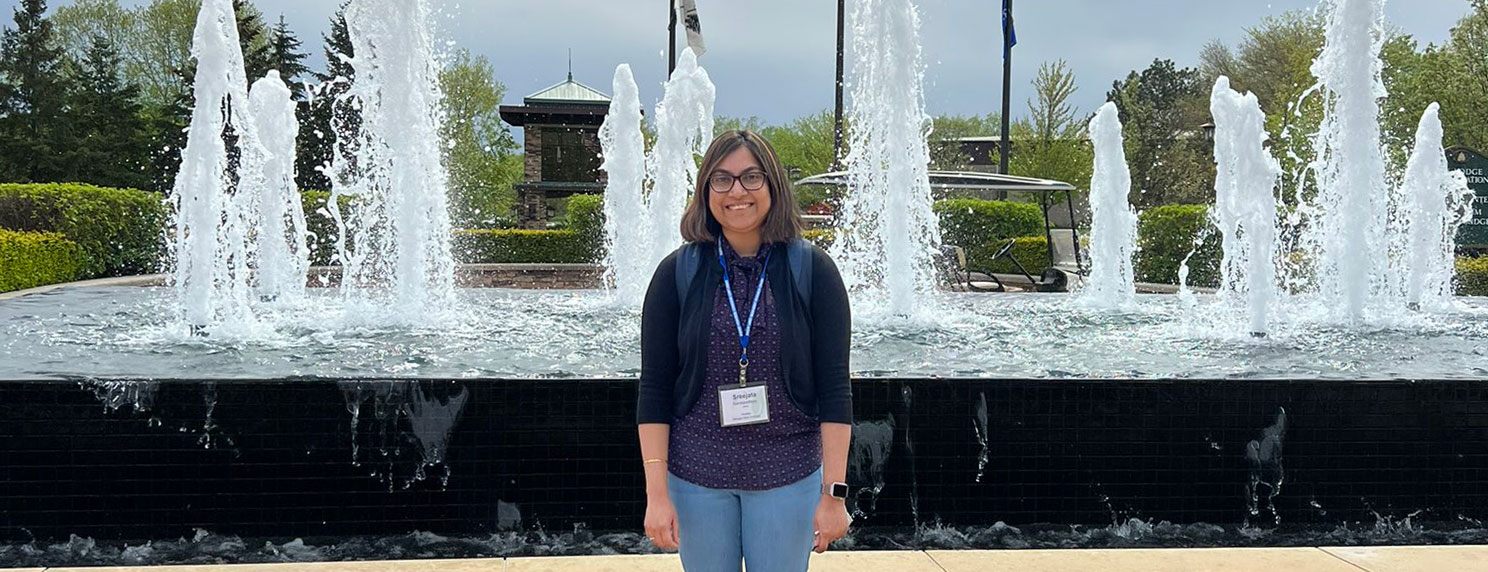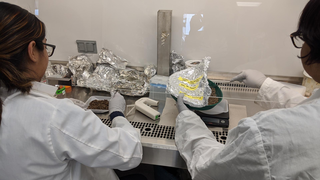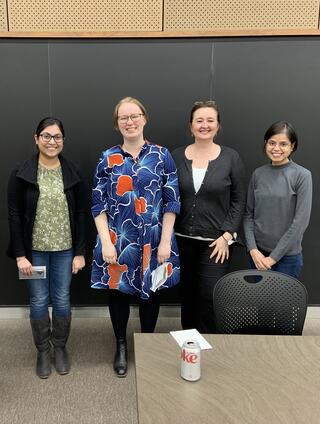
Our students and postdoctoral researchers play an enormous role in the transition to a sustainable, resilient, and affordable energy future that is centered on social and economic equality. From lab experiments to field work to classrooms, these leaders of today and tomorrow are our catalysts for energy discovery.
In this series, we learn more about what inspired these talented researchers, what brought them to their field of study, and the questions that drive their work at the Great Lakes Bioenergy Research Center (GLBRC).
With more frequent and severe drought periods on the horizon, how might we shield our cropping systems from the effects of climate change? Sreejata Bandopadhyay seeks to address this growing issue through her postdoctoral research in Ashley Shade’s lab at Michigan State University. She looks for solutions within the uncharted mysteries of the soil microbiome, where plants recruit helpful bacteria to aid them during stress events. We asked Sreejata about her academic path, her interest in microbiome resilience, and the importance of her research for crop system management.

Can you explain your academic background and your current research focus?
I completed my PhD in 2019 at the University of Tennessee in Knoxville. My research focus was to understand the impacts of biodegradable plastic mulch films on the soil microbial community to inform growers of the feasibility of these biodegradable alternatives. My current research in the Shade Lab extends from that by incorporating plants into soil–microbe interactions. I'm looking at these interactions during stress events that are anticipated due to climate change.
There are a couple projects that I'm working on: the first is to understand how microbes respond to different plant stress signals. When a plant is stressed, it releases phytohormones, and I'm trying to understand what specific soil microbes can respond to that signal and revive from a dormant state, a process called dormancy resuscitation. I’m also trying to understand how these complex microbial communities respond as a whole system, so I’m looking at both individual microbes and community-level responses. Finally, I’m trying to understand how plants mediate the root-associated soil microbiome’s response to drought.
What are the long-term applications of your research?
For the drought experiment, we want to propose certain microbial taxa which are uniquely present in association with a plant during drought events. This experiment only lasted six days and was done in the greenhouse. Further research needs to be conducted at the strain and community level, but the idea is that if there are certain microbes that are sensitive enough to be recruited in such a short window then we can do larger trials with them in the field to see if applying them to plants or soils improves plant performance and drought resilience. That would be the real application of it. More broadly, the outcomes of this research could impact our decisions on how we tackle long-term crop management, and when it should be tailored to specific plants, soils, microbes, or stressors.

Is there a concept related to your research that you wish people understood better?
In the Shade Lab, I work to understand dormancy resuscitation dynamics of soil microbial communities in response to plant stress. I think this is an area that we haven't yet tapped into much. A significant proportion of the soil microbiome is dormant at a given time, up to 80 percent! That could be a really big reservoir of hidden functions which we are trying to tease apart.
What initially attracted you to MSU?
Being able to study the impacts of climate-related stress events and its influences on the plant-soil-microbe interactions is what really brought me to MSU. My primary research interest is to explore microbial responses to environmental disturbances in agroecosystems. I'm also really interested in developing and promoting sustainable agricultural solutions, and I found that the Shade Lab does a lot of these really cool plant investigations using both agriculturally relevant crops as well as biofuel crops like switchgrass. I felt that plant research was a gap in my PhD that I wanted to expand my skill set on, so the Shade Lab really paved the way for me to come to MSU.
What do you enjoy most about your current research?
I enjoy the fact that I am working on a global problem of climate stress on crops and trying to address it in my own small way through research. Doing an experiment and looking at the results the next day is one of the most exciting aspects of being able to do science. I have done a lot of bench work, but there's also a huge data analytics part of it because we deal with big DNA sequencing datasets which require a lot of time and computational skills to interpret. I enjoy both. I feel like I get a flavor of both worlds.

What are your aspirations for the future?
I want to continue working, keeping in mind a more applied context of my research. I'm interested in moving on to the industry, especially where it’s aligned with my vision of promoting sustainable agricultural practices and developing microbial solutions which can impact global food security. In my career trajectory, I see my work being implemented in a product that will benefit agriculture. I’m more industry-oriented that way.
What are your hobbies and interests outside of your work?
If I'm not working, you will probably find me cooking, eating, practicing music or traveling with my husband and friends. I have trained in Indian classical music and other genres of Indian music as a vocalist. I got out of touch with it during my PhD, but I’m getting back at it now.
Read more about Sreejata’s research and publications on her personal website.
Visit the Shade Lab’s webpage to learn more about their research.